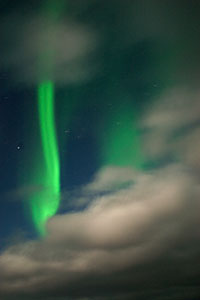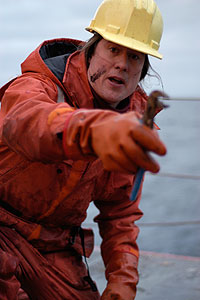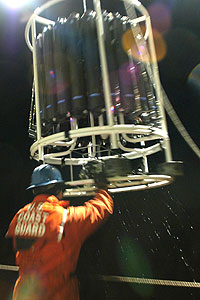|
|
 |
 |
 |
| The northern lights
were briefly visible as we passed through a hole in the clouds. |
Click to enlarge
|
 |
 |
| Seth Danielson gets dirty during the final mooring recovery. |
Click to enlarge
|
 |
 |
| Marine Science Technician Daniel Gaona escorts the CTD back on deck from its final voyage for the Shelf-Basin Interactions project. |
Click to enlarge
|
Daily Update
Calendar
Dispatch 29 - September 29, 2004
By C. A. Linder
Weather conditions: Mostly cloudy skies, snow showers, 10-15
kt winds gusting to 20 kts, 3-5 ft seas, air temperature 31°F
The Last Mooring
I have to thank Devin from Mount Alvernia Academy for his question
about the northern lights yesterday... I think you brought me luck
last night, because for only the third night on the cruise, the clouds
parted long enough to see a beautiful green
aurora borealis. Can you help us out tonight, too?
I wasn't the only lucky one today, either. Tom and Seth had a nice
calm morning for recovering their mooring, and they didn't waste any
time. The mooring was on deck before
sunrise, and Seth was busy all day downloading the precious data.
We spent the rest of the day completing a final line of CTD casts.
At 10PM, it was time to turn south. Marine Science Technician Daniel
Gaona was happy to deploy the final CTD
of the entire three-year Shelf-Basin Interactions project. It was
the 157th CTD cast of the cruise.
These excellent questions are from fifth and sixth grade students
at Mount Alvernia Academy in Chestnut Hill, Massachusetts.
Brittaney (5th grade): Has anyone ever fallen overboard?
Answer: No one has fallen overboard on this trip,
although it has happened on research cruises. Given the rough seas
we have experienced lately, everyone is very careful when moving around
outside on the decks, especially around the bow and stern of the ship.
We had a vivid reminder of how powerful the ocean can be when we were
on the stern this morning during the mooring recovery. Dean Stockwell
opened the door to his van and discovered several inches of water
on the floor. Keep in mind that his van is located at least 25 feet
from the aft end of the ship and is raised off the deck by about a
foot. Even more impressive was the van next to his--the wave had smashed
a sizeable dent in the door. Captain Oliver told me that he suspected
it happened two nights ago when the storm was at its strongest. He
said that as the ship changes course to run with the prevailing swell
waves, fast moving waves can overtake the ship before we get back
up to speed. This particular wave managed to surge over 25 feet of
open deck and pound in a metal door. If anyone had been on deck at
that time, they could have been washed overboard. That's why these
areas are closed off during heavy seas--the danger is very real.
Casey (5th grade): When do you estimate Global Warming is
going to happen?
Answer: Hi Casey, great question. The answer is that
Global Warming is already happening, and it has been happening for
some time. A quick look at the headlines of major news publications
reveals that climate change is quickly gaining international attention.
"Global Warning: Bulletins from a Warmer World" (National Geographic,
September 2004) and "Defusing the Global Warming Time Bomb" (Scientific
American, March 2004) are two examples that spring to mind. Although
the media attention has been quite prominent lately, the Earth's surface
temperature has been rising sharply since the 1950s. Evidence of a
warming world--from flooding in Bangladesh to a shrinking Arctic ice
cap--has been well documented by scientists all over the world. The
Arctic is warming several times faster than most of the planet. Since
1979, ice cover in the Arctic has decreased by 9% per decade. The
measurements we have made over the course of this three year project
will be used in computer models that aim to predict how this climate
change will affect the Arctic, and ultimately, the rest of the world.
Sam (6th grade): Is there really such a thing as Global Warming
or are the temperatures changing rapidly like they did in the 1800's?
Answer: I'll begin this answer with some quotes from
the articles I mentioned above. "Global warming is real, and the consequences
are potentially disastrous" (Scientific American) and "It's
not a belief system; it's an observable scientific fact" (National
Geographic). The Earth's climate has indeed undergone historical
climatic shifts, as scientists have determined from studying clues
left behind in sediments and ice cores. The rise we have seen in the
past 50 years, however, is the greatest that we have seen in the past
1,000 years, and climate prediction models tell us that this change
cannot be entirely due to natural causes. Since the mid-1800s, the
clearing of forests and burning of fossil fuels has contributed to
a major increase in our atmosphere's carbon dioxide levels. The rise
in carbon dioxide perfectly mirrors the rising thermometer. The indications
are clear--the Earth is heating up, and we are largely responsible.
Global warming is a major topic of research that will continue to interest scientists for years to come. If the Arctic Edge project has sparked your interest, then I'll consider my mission as dispatch writer accomplished. Sam & Casey--you and your classmates are the Bob Pickarts and Tom Weingartners of tomorrow. Study hard in school and you may be leading your own Arctic expedition someday.

|
Traducido al Español por
David
|
El ultimo mooring
Tengo que darle las gracias a Devin de la Mount Alvernia Academy por tu pregunta sobre la auroras boreales ayer… Creo que me trajo suerte la pasada noche, por que desde la tercera noche de la campaña esta fue la unica en que las nubes dejaron bastante hueco para ver las preciosas auroras verdes. Puedes ayudarnos esta noche tambien?
No fui el unico afortunado hoy, Tom y Seth tuvieron un dia calmado para recoger su mooring, y no desperdiciaron el tiempo. El mooring estaba en el barco antes del amenecer, y Seth estuvo ocupado todo el dia bajando sus preciados datos. El resto del dia completamos el transecto de CTD. A las 10 de la noche, fue el momento de virar al sur. El tecnico de la tripulacion Daniel Gaona estaba feliz por haber realizado el ultimo CTD de los tres años del proyecto SBI. Era el numero 157 de CTDs realizadas en esta campaña.
Estas excelentes preguntas vienen de estudiantes de quinto
y sexto grado de la Mount Alvernia Academy en Chestnut Hill, Massachusetts.
Brittaney (quinto grado) : Se cayo alguien por la borda?
Respuesta: Nadie se cayo en esta campaña, aunque
ha pasado en campañas anteriores. A pesar de la fuerte marejada que
tuvimos dias anteriores, todo el mundo tenia mucho cuidado cuando
nos moviamos por el exterior del barco, especialmente en la proa y
an la popa. Tenemos un recuerdo de lo poderoso que puede ser el oceano,
cuando estabamos en la popa esta mañana recogiendo el mooring, Dean
Stockwell de su laboratorio y vio que habia unos centimetros de agua
en el suelo. Teniendo en cuenta que este laboratorio esta a unos 8
metros del final del barco y ademas esta elevado medio metro del suelo.
Mas impresionante fue ver el laboratorio de al lado, la ola dejo un
cosiderable abolladura en la puerta. El capitan Oliver me conto que
sospechaba que eso paso hace dos noches cuando la tormenta era mas
fuerte. Me dijo que el barco cambio su rumbo para navegar con el mar
de fondo predominante, las olas rapidas pueden sobrepasar el barco
antes que nosotros la podamos evitar. Esta ola en particular consiguio
sobrepasar los 8 metros de altura del barco y golpear la puerta metalica.Si
alguien hubiera estado en la borda en ese momento le habria arrastrado
al mar.. Es por esta razon por la que permanecieron cerradas durante
la tormenta. El peligro era real.
Casey (quinto grado): Cuando estimais que el sucedera el calentamiento
global?
Respuesta: Hola Casey, gran pregunta. La respuesta
es que el calentamiento global esta sucediendo ya y desde hace algun
tiempo. Si echas un vistazo a la mayoria de las publicaciones te daras
cuenta de que el cambio climatico esta ganadose la atencion internacional.
“Calentamiento Global: Cronica de un planeta mas caliente” (National
Geographic, Septiembre 2004) y “Desarmando la bomba del Cambio
Global” (Scientific American, Marzo 2004) estos son dos ejemplos
que me vienen a la cabeza. Aunque la atencion de los medio ha sido
importante ultimamente, la temperatura superficial de la tierra ha
ido subiendo intensamente desde 1950. Evidencias de un calentamiento
global, desde inundaciones en Bangladesh hasta la reduccion de la
capa de hielo artica ha estado bien documentada por cientificos de
todas partes del mundo. El Artico se esta calentando varias veces
mas rapido que el resto del planeta. Desde 1979, el hielo que cubria
el Artico ha ido decreciendo un 9% cada decada. Los datos que hemos
estado tomando durante estos tres años de proyecto van a ser usadas
para realizar modelos que pueden predecir como el cambio climatico
va a afectar al Artico, y como consecuencia, al resto del mundo.
Sam (sexto grado): Hay realmente un calentamiento global o
las temperaturas estan cambiando rapidamente como paso en el siglo
XIX?
Respuesta: Empezare esta contestacion con unas citas
de los articulo que he mencionado anteriormente. “Calentamiento Global
es real, y sus consecuencias son potencialmente desastrosas” (Scientific
American) y “Esto no es cuestion de fe, es un hacho cientifico
observable” (National Geographic). El clima de la Tierra
a pasado por cambios historicos en el clima, como los cientificos
han determinado a partir de las señales que dejan las muestras de
sedimentos y de hielo. El incremento que hemos visto en los ultimos
50 años es el mayor que se ha visto de los ultimos 1000 años y los
modelos de prediccion climaticos nos indican que estos cambios no
pueden ser enteramente debidos a causas naturales. Desde mitad del
siglo XIX la deforestacion de los bosques y la quema de combustibles
fosiles han contribuido al mayor incremento de emisiones de Dioxido
de Carbono en nuestra atmosfera. Este incremento de dioxido de carbono
es reflejado en el aumento de las temperaturas, los indicios son claros,
la Tierra esta calentandose y nosotros somos muy responsables.
El Calentamiento global es un tema principal de investigacion cientifica que va a continuar interesando a los cientificos en los años siguientes. Si el Proyecto al Limite del Hielo ha captado tu atencion, entoces creo que mimision como escritor se ha cumplido. Sam y Casey, vosotros t vuestros compañeros de clase podriais ser los futuros Bb Pickarts y Tom Weingartners del mañana. Estudiar mucho en la escuela y asi podreis dirigir vuestra propia expedicion al Artico algun dia.
 Previous
Dispatch
Next Dispatch Previous
Dispatch
Next Dispatch

Back to Calendar
|
|




